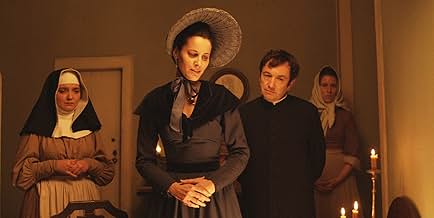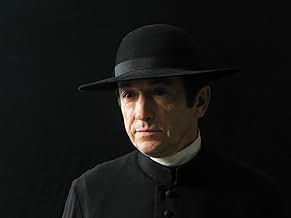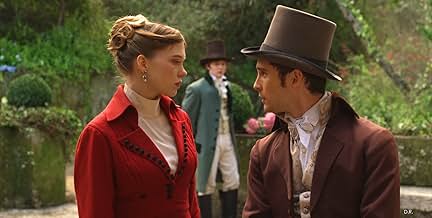PUNTUACIÓN EN IMDb
7,4/10
3,6 mil
TU PUNTUACIÓN
Añade un argumento en tu idiomaFollows a jealous countess, a wealthy businessman, and a young orphaned boy across Portugal, France, Italy and Brazil where they connect with a variety of mysterious individuals.Follows a jealous countess, a wealthy businessman, and a young orphaned boy across Portugal, France, Italy and Brazil where they connect with a variety of mysterious individuals.Follows a jealous countess, a wealthy businessman, and a young orphaned boy across Portugal, France, Italy and Brazil where they connect with a variety of mysterious individuals.
Explorar episodios
Argumento
¿Sabías que...?
- PifiasThe movie is set during the late 1700's to early 1800's. During the ballroom scene, several shots make it obvious that the gowns worn by the women have zippers in the back but the zipper wasn't invented until 1851.
- Versiones alternativasAlso exists as a shorter (by about an hour), theatrically released, feature film version, Mistérios de Lisboa (2010).
- ConexionesEdited from Mistérios de Lisboa (2010)
Reseña destacada
When Raoul Ruiz adapts existing material, he tends to reconfigure the narrative in a playful way, often obliterating all coherence in the process. In his writings on film, specifically Poetics of Cinema, he is quite critical of what he calls central conflict theory. The idea behind this theory is that narrative, especially film narrative, must be built around a single conflict and that every aspect of the plot must build on this conflict one way or another. Ruiz noticed this phenomenon and gave it a name, but it was so common that popular screen writing guides used it as an incontrovertible rule. Poetics of Cinema is devoted almost entirely to explaining and criticizing central conflict theory. Ruiz was never content merely to criticize this simplistic yet ubiquitous narrative structure in writing, however; commentary on it is often embedded in the films he makes. Unsurprisingly, his films intentionally eschew anything resembling this structure but they tend to go even further and offer playful deconstructions of the concept.
Although I can't claim much familiarity with the novel Ruiz is adapting in Mysteries of Lisbon (it apparently hasn't been translated to English yet) it undoubtedly lends itself especially well to his ludic, subversive style. Rather than follow the conflict of a single continuous narrative, Mysteries of Lisbon explores several interrelated narrative strands that complement one another unusually well as they're full of cases of important coincidental relationships and frustrated love affairs. Thus, Ruiz has less to subvert and more to emphasize.
Ruiz's visual style has always been highly unusual. He favors the frequent use of Dutch angles and he often creates startling juxtapositions with his unusual framing techniques and occasional superimpositions. While these unusual techniques are always welcome, they can become somewhat exhausting when they occur frequently. Since Mysteries of Lisbon is unusually long (the version I watched was around 260 minutes) it's perhaps unsurprising that Ruiz manages to space these out carefully enough to draw attention to all the right places and break up the monotony of the more conventional period piece style he favors in this film. Even at its least inspired, however, Mysteries of Lisbon offers far more visual stimulation than the stuffy fidelity of a film by Merchant and Ivory or Oscar fodder such as The King's Speech. Unlike most directors working with similar material, Ruiz captures vast landscapes and baroque interiors with the same effortless mastery. Even the frequent long takes are made more interesting by carefully employed tracking shots.
Mysteries of Lisbon represents the rare combination of a director at the top of his game working with material perfectly suited for his unique sensibilities. Cinema doesn't get much better than this.
Although I can't claim much familiarity with the novel Ruiz is adapting in Mysteries of Lisbon (it apparently hasn't been translated to English yet) it undoubtedly lends itself especially well to his ludic, subversive style. Rather than follow the conflict of a single continuous narrative, Mysteries of Lisbon explores several interrelated narrative strands that complement one another unusually well as they're full of cases of important coincidental relationships and frustrated love affairs. Thus, Ruiz has less to subvert and more to emphasize.
Ruiz's visual style has always been highly unusual. He favors the frequent use of Dutch angles and he often creates startling juxtapositions with his unusual framing techniques and occasional superimpositions. While these unusual techniques are always welcome, they can become somewhat exhausting when they occur frequently. Since Mysteries of Lisbon is unusually long (the version I watched was around 260 minutes) it's perhaps unsurprising that Ruiz manages to space these out carefully enough to draw attention to all the right places and break up the monotony of the more conventional period piece style he favors in this film. Even at its least inspired, however, Mysteries of Lisbon offers far more visual stimulation than the stuffy fidelity of a film by Merchant and Ivory or Oscar fodder such as The King's Speech. Unlike most directors working with similar material, Ruiz captures vast landscapes and baroque interiors with the same effortless mastery. Even the frequent long takes are made more interesting by carefully employed tracking shots.
Mysteries of Lisbon represents the rare combination of a director at the top of his game working with material perfectly suited for his unique sensibilities. Cinema doesn't get much better than this.
- timmy_501
- 31 may 2011
- Enlace permanente
Selecciones populares
Inicia sesión para calificar y añadir a tu lista para recibir recomendaciones personalizadas
- When was Mysteries of Lisbon released?Con tecnología de Alexa
Detalles
- Fecha de lanzamiento
- Países de origen
- Sitios oficiales
- Idiomas
- Títulos en diferentes países
- Mysteries of Lisbon
- Localizaciones del rodaje
- Empresas productoras
- Ver más compañías en los créditos en IMDbPro
Contribuir a esta página
Sugerir un cambio o añadir el contenido que falta

Principal laguna de datos
By what name was Misterios de Lisboa (2011) officially released in India in English?
Responde
































